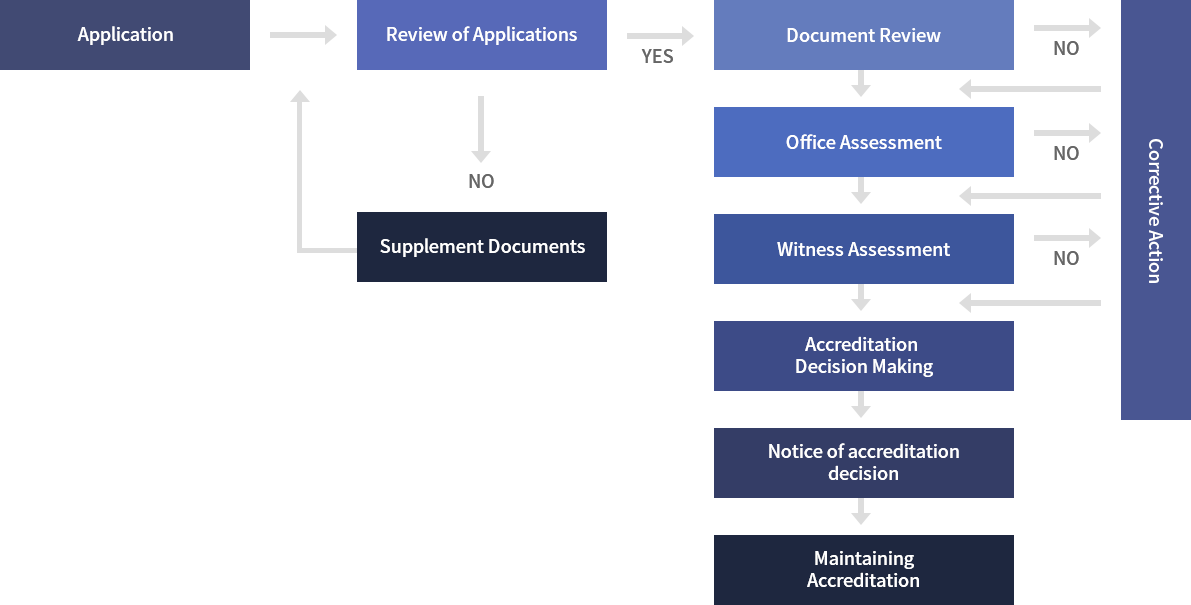Accreditation Process

Accreditation Process guides you through the process for a certification body to be accredited by KAB.
Review of Applications
KAB will review the application documentation and inform the applicant of the results. KAB considers the application process complete only when the application fee is fully paid, and then initiates the subsequent application review procedures.
Document Review
Document review involves the evaluation of the documented management system of the CAB. This is carried out to:
- a) Review the CAB's management system documented information.
- b) Evaluate the CAB's office conditions and engage in discussions with the CAB's personnel to determine preparedness for the office assessment.
- c) Assess the CAB's understanding of accreditation criteria.
- d) Gather necessary information about the applied accreditation scope, including the CAB's offices, personnel, and levels of control.
- e) Review the allocation of the office assessment team and confirm the details.
- f) Provide a focus for the office assessment.
- g) Evaluate the planning and execution of internal audits and management reviews.
Office Assessment
The office assessment is intended to verify the CAB's eligibility to operate a conformity assessment system within the accreditation scheme it is applying for. This assessment aims to confirm:
- a) Information and evidence of conformity with all requirements of the applicable accreditation criteria.
- b) The effectiveness of operations, verified by examining the records of the accreditation scheme.
- c) The CAB's ability and performance in meeting applicable scheme requirements.
- d) Control of any outsourced processes, if applicable.
- e) The effectiveness of internal audits and management reviews.
- f) Management's responsibility for the CAB's policies.
Witness Assessment
KAB witness assessments are carried out in accordance with ISO/IEC 17011:2017, 7.4.7, scheme-specific requirements, and KAB-AR-MD8, KAB-AR-MD16, KAB-AR-MD17, etc. to achieve the following objectives:
- a) On-site verification of the effective implementation of the CAB's conformity assessment programs and procedures. This includes evaluating the assignment of competent teams and timing.
- b) Observing the conformity assessment personnel to determine if they:
- -Adhere to the CAB's procedures.
- -Adequately address the requirements of:
- * Conformity assessment requirements.
- * Applicable KAB-R requirements.
- * Relevant KAB-AR documents.
- * Any relevant sector-specific requirements, as applicable.
- c) Collecting a representative sample of the CAB's competence across the accreditation scope.
Accreditation Decision-Making
KAB makes accreditation decisions for initial accreditation, extension/reduction of accreditation scope, and suspension/withdrawal of accreditation. These decisions are based on the results of accreditation assessments and a review of other related information. The decision-making process involves two stages, detailed below, to ensure independent, fair, and professional decision-making.
- - Review of Assessment Records
- - Accreditation Review Committee
Public Notice of Accreditation Decisions
Accreditation decisions are uploaded on the KAB official webpage, accessible to the public, and communicated to the CAB through official correspondence. The decision becomes effective from the publication date. However, when an accreditation decision necessitates a registration fee, such as initial or renewal accreditation, the accreditation certificate will be issued after the required fee is fully paid.
All accreditation decisions take effect on the date of notification.
Maintaining Accreditation
CABs initially accredited by KAB must adhere to the requirements listed in 7.2 in order to maintain their accredited status. During the accreditation cycle, KAB will conduct a series of surveillance activities to ensure the ongoing effectiveness of KAB accreditation.
Periodic Surveillance Assessments
Periodic surveillance will be carried out at least once per year from the date of accreditation. However, during the first year of initial accreditation, surveillance will occur semi-annually. The assessment process mirrors the initial accreditation assessment and aims to evaluate ongoing conformity and the implementation of the certification body's quality system. Document review may not be included, unless otherwise determined.
Special Asseessment
Special assessments may occur in specific cases, and plans for these assessments may not be communicated to the CAB in advance or may only be communicated on the day of evaluation. Special assessments can take place:
- a) To investigate received complaints/appeals.
- b) To investigate actual or potential violations of critical accreditation requirements.
- c) In response to external requests for guidance or oversight of the CAB from government entities, etc.
Accreditation Renewal Assessment
Accreditation renewal assessments occur every four years from the date of accreditation. Accredited bodies are required to submit re-accreditation application forms at least four months before the accreditation expiration date. This submission does not involve an application fee. During the reassessment, the KAB assessment team reviews the complete quality system of accredited bodies to ensure ongoing suitability against accreditation criteria.






